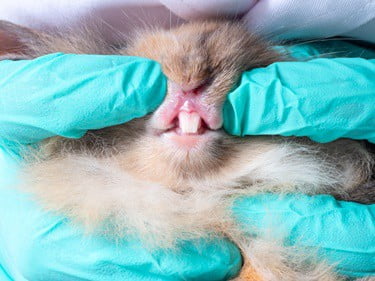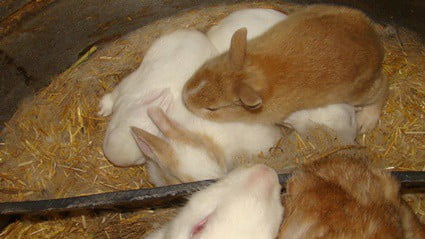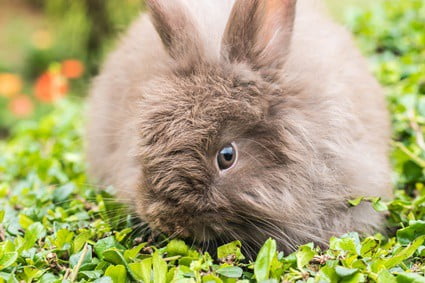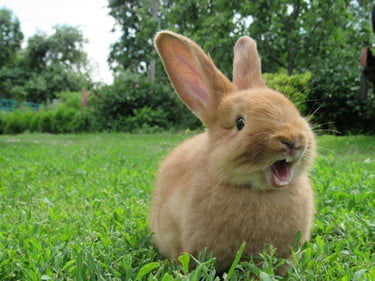One unmistakable feature of a rabbit is its large front teeth. So, you’d be forgiven for thinking that these teeth were always there, even once a baby rabbit was born. However, that’s not the case.
Baby rabbits aren’t born with teeth. Instead, kits grow them when they are between 19 and 21 days old. Before they reach adulthood, bunnies have 16 deciduous teeth and 28 permanent teeth. Rabbits eventually lose their 16 milk teeth and are left with 6 incisors, 6 upper premolars, 4 lower premolars, 6 upper molars, and 6 lower molars. Rabbits don’t have canine teeth because they are herbivores. Rabbits rarely need to tear into meat or eat meat off the bone.
A rabbit’s teeth grow continuously. This means that the animal must keep them filed down; otherwise, a range of serious health issues will occur. Diet plays an integral part in this. Replicating what a rabbit eats in the wild is the easiest way to ensure your pet receives the right foods to keep their teeth strong and healthy.
When Do Baby Rabbits Get Teeth?
According to Veterinary Nurse, rabbits are diphyodont, meaning they have two sets of teeth throughout their lifetime. During infancy, they have 16 deciduous (milk teeth) and 28 permanent teeth. As they develop into adulthood, rabbits lose their milk teeth, which are subsequently replaced by their permanent teeth.
Baby rabbits aren’t born with their teeth. Instead, they get them when they are around 19 to 21 days old. At this point, they will start to chew on vegetables, fruits, and hay to get used to their growing teeth and keep them ground down to a comfortable and safe length.
What Kind of Teeth Do Baby Rabbits Have?
The large front teeth you see in a rabbit’s mouth are the incisors. They have four maxillary incisors and two mandibular incisors.
The maxillary incisors are shorter than the mandibular. They also feature a groove that runs down the surface’s length, giving the teeth their signature look. Behind the top incisor teeth are two small peg teeth called the auxiliary incisors.
Rabbits also have cheek teeth that enable them to grind their food from side to side. The cheek teeth consist of six upper premolars, four lower premolars, six upper molars, and six lower molars.

According to Today’s Veterinary Nurse, rabbits don’t have canine teeth. Instead, they have a space between the incisors and premolars called the diastema. As herbivores, rabbits do not need to tear meat or chew on bones, so the combination of teeth they possess are perfectly suited to their dietary and eating requirements.
The back part of the teeth is coated in dentin, which is softer than enamel. It wears down faster than enamel and is slightly less hard-wearing. Supplying easy to eat foods is a must; otherwise, the back teeth can become damaged.
A rabbit’s teeth are also open rooted, meaning they’ll grow continuously throughout its lifetime. The front incisors alone can grow up to 12 cm a year. Therefore, you must provide your pet with a fibrous feed that allows the teeth to wear down naturally.
Food that is too soft is too easy to eat and doesn’t do a rabbit’s teeth any good. The result is that a rabbit’s teeth will grow too long through a lack of teeth grinding.
Do Bunnies Go Through Teething?
Baby rabbits lose their primary teeth when they are only a few months old. From an early age, you might notice that your rabbit begins to display destructive behaviors by chewing excessively on everything in sight. This can be a real problem, especially if your pet lives inside your home and has access to dangerous cables.
Because bunnies don’t have their milk teeth for long, they don’t go through what humans know as the teething process. However, they will chew through whatever they can get hold of to wear their teeth against each other, which keeps them trimmed down to a healthy length. In the wild, rabbits chew grass and plants to prevent teeth from overgrowing.
Why Do Rabbits Chew?
When it comes to excessive chewing, the problem lies when rabbits are only fed commercial rabbit pellets. A diet of this nature doesn’t provide rabbits enough opportunity to trim their teeth down as it’s too soft. Therefore, as a rabbit owner, you need to provide ample chew aids to keep your pet away from furniture or parts of its wooden cage. Starting this when your rabbit is a bunny will teach it good habits.
Some rabbits chew because of boredom. It may appear that they are teething, but if a rabbit lives alone or has nothing in the way of stimulation, it will try to occupy itself or get its owner’s attention through excessive chewing. Psychological chewing is a problem and rarely related to a rabbit’s teeth. To stop it, appropriate action must be taken as early as possible.
Rabbits are also curious creatures. They’re full of energy and love to explore small gaps, cracks, and nooks inside the home. As they investigate, they will chew what they find and burrow in an attempt to build a tunnel. Inside the house, they will rarely succeed but will instead leave a path of destruction behind them.
How to Keep Baby Rabbit Teeth Healthy?
Both baby and adult rabbits eat foods that are naturally high in fiber. This type of food requires a lot of chewing and grinding, which safely wears the teeth down and keeps them at a comfortable length.
A rabbit uses its incisors to bite off bits of food. They stay sharp as they are required to be for this important task. Once the right amount of vegetation has been bitten off, the cheek teeth then grind it down to be easily swallowed and digested.
Diet is one of the most essential aspects in keeping a baby rabbit’s teeth healthy, which will continue into adulthood. Therefore, giving your rabbit the right nutrition is necessary.
However, as a pet owner, you can also provide many things to keep your rabbit’s teeth healthy. The following will help with your rabbit’s teeth maintenance:
Feed Your Rabbit Hay
Hay and fresh grass should make up at least 80% of a baby and adult rabbit’s diet. Providing both encourages long periods of chewing, which helps prevent dental disease in the long-term. In the wild, rabbits graze for around 6-8 hours a day, so reflecting their natural diet will help your baby rabbit’s teeth grow healthy. It also helps with digestion.
Hay affects the entire rabbit’s digestive tract, from the teeth to the gut. Chewing on grass also keeps a rabbit occupied, preventing destructive chewing behaviors that can harm the animal and cause you stress.
Fruit and Vegetables
As well as hay and grass, rabbits should be provided with at least three types of fruit or vegetables a day, including at least one fibrous vegetable. Try to incorporate veggies such as cauliflower leaves, cabbage, broccoli, spinach, and other similar food types into your rabbit’s diet to keep its teeth healthy and naturally filed down. Only provide fresh vegetables as they offer the most value.
These vegetables act in the same way as hay in that your rabbit needs to grind them before digesting them, keeping the teeth the right length.

Calcium
Surprisingly, it’s thought that many pet rabbits are deficient in calcium. Calcium is an essential nutrient that keeps bones and teeth strong and healthy. It can also prevent a range of dental issues and osteoporosis. Without enough calcium in the body, a rabbit’s teeth can become so brittle that they crumble from the mouth.
However, there’s a delicate balance, as too much calcium can also cause problems. Calcium only needs to be about 0.5% – 1.0% of your rabbit’s diet. Parsley, oranges, and dried apricot are excellent sources of calcium and make a tasty treat.
Objects To Chew
Your rabbit has a natural desire to chew, so you’ll need to redirect the urge or it will become a problem. To keep teeth a safe length and shape, provide objects that your rabbit can chew on safely. Without stimulation, rabbits will chew on anything to occupy themselves.
There are plenty of safe chew toys you can provide your pet with. Apple or willow tree branches, cardboards, and untreated grass mats also offer a satisfying chewing experience that will keep your rabbit’s teeth the perfect length.
Don’t offer any kind of wood that can easily splinter or any small chewable objects that can become lodged in your rabbit’s throat. These are choking hazards. Also, allowing your pet to consume any dangerous materials that can disrupt their digestive system and lead to death in extreme cases.
Common Rabbit Dental Problems
Though many people see rabbits as rodents, they are actually lagomorphs. This describes any animal that possesses continuously growing teeth. Hares and pikas are also included in this group.
The problem rabbits face with having tube-shaped incisors behind the large upper incisors is that they can grow too long and cause many painful health issues. Teeth must be able to wear down at the same rate as they’re growing; otherwise, the following problems will arise:
Malocclusion
If a rabbit’s teeth aren’t worn down properly, malocclusion can occur, which is when the teeth don’t meet comfortably when the jaw is closed. As described in a journal on the US National Library of Medicine, the continuous growth of all teeth makes them more susceptible to malocclusions.
With malocclusion, sharp points on the edges of the teeth have the potential to cut the rabbit’s mouth, cheeks, and gums. Furthermore, long teeth can trap the tongue, while overgrown molars might prevent the mouth from closing altogether.
All of the above can cause pain and discomfort and will almost certainly impact a rabbit’s ability to eat. It might even be too difficult for them to do so, leading to a reduction in appetite and subsequent weight loss. Abscesses and sores can form, and a rabbit might develop problems grooming.
To combat this, start by providing enough roughage, fiber, and grass in your pet’s diet. Doing so will allow rabbits to grind their teeth down and avoid discomfort. Providing this type of diet from an early age will prevent issues when your rabbit reaches adulthood.
Most pet rabbits eat a combination of hay and soft pellets, which doesn’t reflect a rabbit’s natural diet of grass and other roughage. Pellets, in particular, crumble easily in the mouth.
Dental Caries
Dental caries is caused by a bacterial infection and causes tooth decay and demineralization. The acid produced by bacteria erodes the tooth’s enamel and dentine and causes holes in the tooth’s surface. This can be painful and often leads to root infection and tooth loss.
Dental caries tends to be uncommon in rabbits who can keep their teeth filed down. But for rabbits who can’t or consume too many carbohydrates, it’s more likely to occur. Rabbits are notorious for hiding the condition, so symptoms to look out for include:
- A sudden change in appetite or food preferences
- Drooling
- Wet or matted fur
- A reluctance to eat or drink
- Weight loss
- Bad breath
- Lethargy
- Poor coat condition
Any of the above could be a sign that your rabbit is suffering from dental caries, in which case, you’ll need to seek veterinary treatment. Affected teeth might require removal. In most cases, your pet’s diet will need to be amended and monitored to ensure it provides all the nutrients your rabbit needs.

Abscesses
If a rabbit’s cheek teeth are misaligned or not wearing down evenly, sharp points can occur on the tooth. These spurs or spikes can pierce through the cheek’s skin, causing severe pain or discomfort. Over time, your rabbit will stop using a particular tooth or will only eat on one side of its mouth to avoid the pain point.
Because a rabbit’s teeth are always growing, the teeth on one side can quickly outgrow the other. The abnormal pressure caused by this often causes painful abscesses to appear on the mouth’s soft tissue, which only gets worse if left untreated. A rabbit may lose its appetite altogether because it’s simply too uncomfortable to eat.
Monitoring your rabbit’s teeth is essential because even the smallest misalignment will cause issues. A baby rabbit needs to receive a high fiber diet as early as possible so that they learn to keep their teeth healthy.
Regularly check inside the mouth for obvious signs of pain or discomfort. A rabbit that can’t close its mouth properly or struggles to eat will likely have teeth problems that need to be treated by a vet. As long as a rabbit has access to chew objects and fibrous foods, it will take care of its teeth itself.

